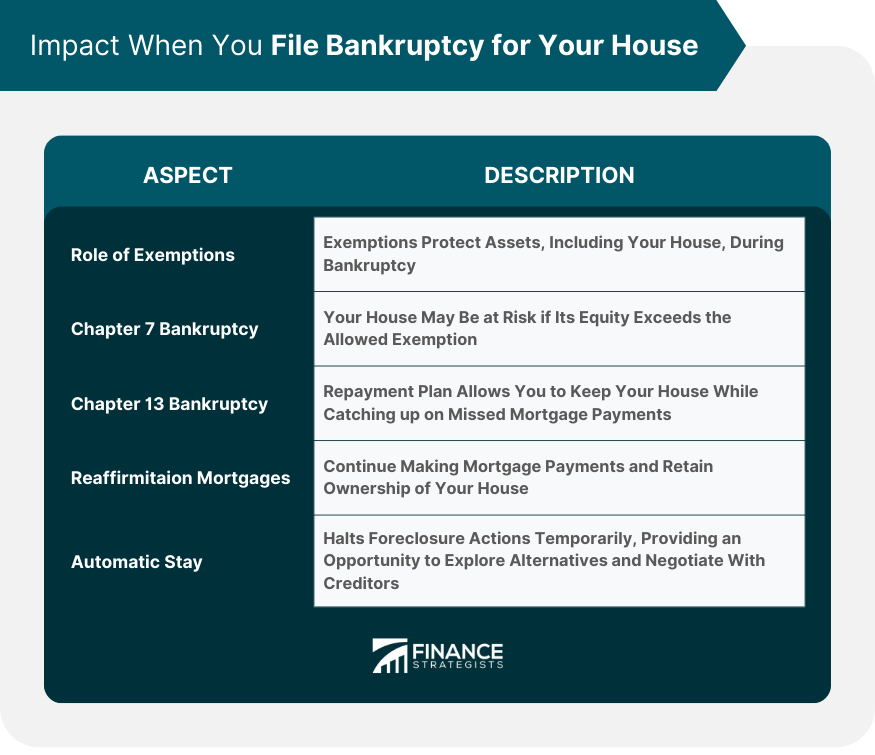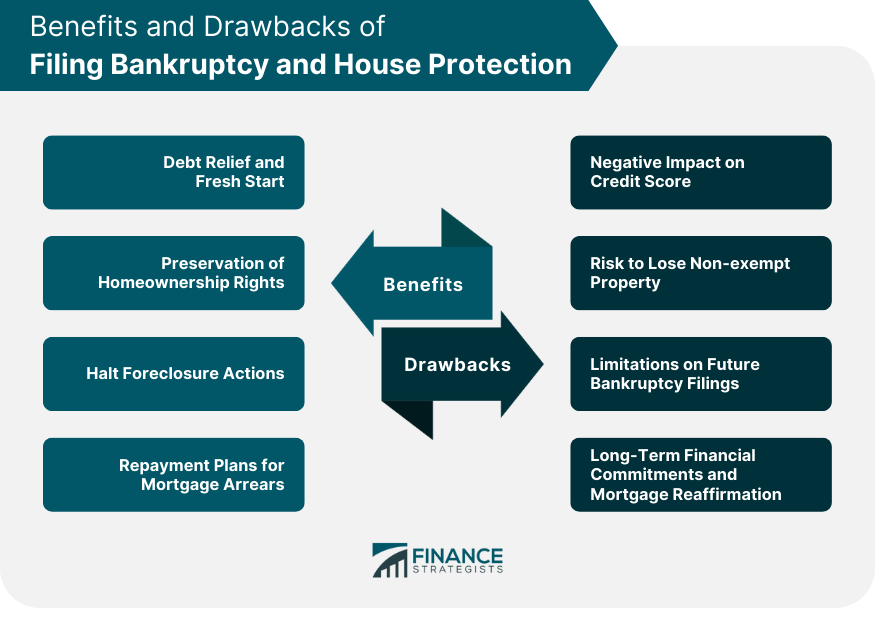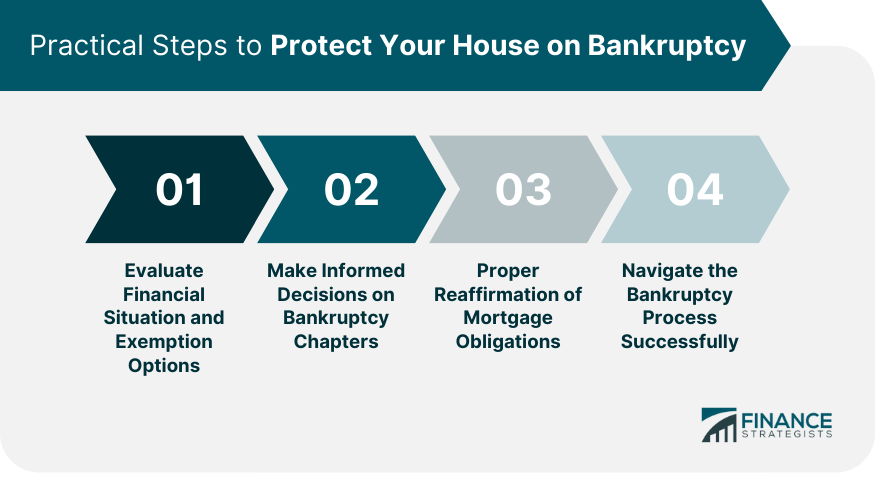Can You Lose Your House if You File Bankruptcy?
Filing for bankruptcy does not automatically mean losing your house. The outcome depends on various factors, including the type of bankruptcy filed and the value of your home.
In Chapter 7 bankruptcy, your house may be at risk if its equity exceeds the allowed exemption.
However, Chapter 13 bankruptcy offers a repayment plan that allows you to catch up on missed mortgage payments and retain ownership of your house.
Additionally, exemptions play a crucial role in protecting your assets during bankruptcy, including your home.
It's important to consult with a bankruptcy attorney to understand the specific laws in your state and explore the best options to protect your house while seeking debt relief through bankruptcy.
Impact When You File Bankruptcy for Your House
When filing for bankruptcy, it's crucial to understand how it can affect your house. Several factors come into play, including exemptions, the type of bankruptcy filed (Chapter 7 or Chapter 13), the process of reaffirming mortgages, and the temporary protection provided by the automatic stay.
Role of Exemptions in the Protection of Assets
Exemptions are laws that safeguard specific assets, including your house, from being seized and sold by creditors to repay debts. Understanding the exemptions available in your state is crucial in determining whether you can retain your house.
Difference Between Chapter 7 and Chapter 13 Bankruptcy
Chapter 7 and Chapter 13 bankruptcy are the most common types for individuals. Chapter 7 involves the liquidation of assets to repay creditors, potentially putting your house at risk if its equity exceeds the allowed exemption.
In contrast, Chapter 13 focuses on creating a repayment plan to manage debts while retaining your assets, including your house.
Reaffirmation Mortgages
Reaffirming a mortgage is an agreement made during bankruptcy proceedings to continue making mortgage payments and exclude the mortgage debt from the discharge. This allows you to retain ownership of your house and continue regular payments.
Automatic Stay
When you file for bankruptcy, an automatic stay goes into effect, temporarily halting all debt collection activities, including foreclosure actions.
This provides temporary protection against losing your house and offers an opportunity to explore alternatives and negotiate with creditors.

Benefits of Filing Bankruptcy and House Protection
Filing for bankruptcy can provide several benefits, including relief from overwhelming debts and the potential to protect your house from loss.
Debt Relief and Fresh Start
Bankruptcy offers a fresh start by eliminating or restructuring debts, providing a pathway to financial stability. This relief can alleviate the burden of debt and help you regain control over your finances.
Preservation of Homeownership Rights
One of the significant advantages of bankruptcy is the potential to retain your house. Bankruptcy laws aim to protect the primary residence of individuals facing financial hardship, allowing them to maintain a stable living situation and avoid displacement.
Halt Foreclosure Actions
The automatic stay triggered by bankruptcy can temporarily halt foreclosure actions, providing valuable time to assess your financial situation, explore options to catch up on mortgage payments or negotiate with lenders.
This breathing space can help you avoid immediate eviction and potentially find a solution to keep your house.
Repayment Plans for Mortgage Arrears
Chapter 13 bankruptcy offers a unique opportunity to catch up on missed mortgage payments through a court-approved repayment plan.
This plan allows you to spread the arrears over a period of three to five years, making it more manageable and increasing the chances of retaining your house.
Drawbacks of Filing Bankruptcy and Potential House Loss
While bankruptcy can provide relief, it is essential to be aware of the potential drawbacks and risks associated with losing your house.
Negative Impact on Credit Score
Filing for bankruptcy can have a significant negative impact on your credit score. This can make it challenging to secure loans or credit in the future and may require substantial effort to rebuild your creditworthiness.
Risk to Lose Non-exempt Property
While bankruptcy aims to protect your assets, including your house, it is crucial to understand the exemptions and limitations. If your property exceeds the allowed exemption or if you have non-exempt assets, there is a risk of losing them during bankruptcy.
Limitations on Future Bankruptcy Filings
Bankruptcy laws impose limitations on filing for bankruptcy again within a specific period. If you face financial hardship in the future, these limitations can restrict your options, including protecting your house through bankruptcy.
Long-Term Financial Commitments and Mortgage Reaffirmation
Reaffirming your mortgage debt during bankruptcy implies a long-term financial commitment. If you default on the mortgage payments after bankruptcy, the lender can pursue legal action to recover the remaining debt, as it was not discharged during the bankruptcy process.

Key Legal Considerations in Filing Bankruptcy and House Protection
Navigating the bankruptcy process and ensuring the protection of your house requires careful attention to legal considerations.
Understand Bankruptcy Laws and Exemptions
Bankruptcy laws vary by jurisdiction, and understanding the specific laws in your state is essential. Familiarize yourself with the exemptions available to protect your house and other assets.
Consult With a Bankruptcy Attorney
Seeking guidance from a knowledgeable bankruptcy attorney is crucial when considering filing for bankruptcy and protecting your house. They can provide expert advice tailored to your situation, help you navigate the complex legal process, and ensure your rights are protected.
Valuation of House and Asset Protection Strategies
Accurate valuation of your house is critical to determine its equity and potential risks during bankruptcy. Understanding asset protection strategies can help safeguard your house and other valuable assets.
Practical Steps to Protect Your House on Bankruptcy
Taking proactive measures and following practical steps can enhance your chances of protecting your house during the bankruptcy process.
Evaluate Financial Situation and Exemption Options
Thoroughly assess your financial situation, including debts, income, expenses, and the equity in your house. Understand the available exemptions and determine if you meet the criteria to protect your house.
Make Informed Decisions on Bankruptcy Chapters
Consider the implications of filing Chapter 7 or Chapter 13 bankruptcy. Evaluate the potential risks and benefits of each chapter based on your specific circumstances to determine the most appropriate course of action to protect your house.
Proper Reaffirmation of Mortgage Obligations
If you choose to reaffirm your mortgage during bankruptcy, it is crucial to understand the legal implications and make informed decisions. Consult with your bankruptcy attorney to ensure you fully comprehend the obligations and consequences of reaffirming your mortgage.
Navigate the Bankruptcy Process Successfully
Complying with the bankruptcy process, including attending mandatory counseling sessions, accurately completing required forms, and meeting all deadlines, is essential to protect your house and achieve a favorable outcome.

Conclusion
Filing for bankruptcy does not automatically mean losing your house. The impact on your house depends on various factors, such as the type of bankruptcy filed (Chapter 7 or Chapter 13) and the exemptions available in your state.
Chapter 7 may put your house at risk if its equity exceeds the allowed exemption, but Chapter 13 offers a repayment plan that allows you to retain ownership while catching up on missed mortgage payments.
Filing for bankruptcy can offer significant benefits, such as debt relief and preservation of homeownership rights, but it also has drawbacks, like a negative impact on your credit score and potential risks of losing non-exempt property.
Ultimately, seeking professional advice and making informed decisions are essential in navigating the complexities of bankruptcy and safeguarding your home.
Can You Lose Your House if You File Bankruptcy? FAQs
There is a potential risk of losing your house when filing for bankruptcy, but it depends on various factors such as exemptions, equity, and the type of bankruptcy filed.
In Chapter 7 bankruptcy, your house could be at risk if its equity exceeds the allowed exemption. It may be sold to repay your creditors, but exemptions can help protect your home.
Yes, Chapter 13 bankruptcy allows you to keep your house. It involves a repayment plan that allows you to catch up on missed mortgage payments and retain ownership while making regular payments.
Exemptions are laws that protect certain assets, including your house, from being seized and sold by creditors. They vary by state and can safeguard your home from loss during bankruptcy.
Yes, reaffirming your mortgage is an option in bankruptcy. By reaffirming, you agree to continue making payments on the mortgage, ensuring you can retain ownership of your house.
True Tamplin is a published author, public speaker, CEO of UpDigital, and founder of Finance Strategists.
True is a Certified Educator in Personal Finance (CEPF®), author of The Handy Financial Ratios Guide, a member of the Society for Advancing Business Editing and Writing, contributes to his financial education site, Finance Strategists, and has spoken to various financial communities such as the CFA Institute, as well as university students like his Alma mater, Biola University, where he received a bachelor of science in business and data analytics.
To learn more about True, visit his personal website or view his author profiles on Amazon, Nasdaq and Forbes.











